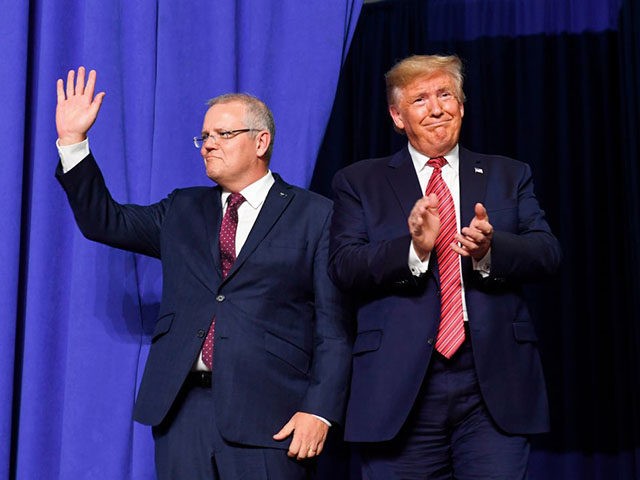A bipartisan U.S. Congress group has slammed China for threatening punitive economic sanctions against Australia. The support follows Prime Minister Scott Morrison’s refusal to drop his call for an independent investigation into the origins of the global Chinese coronavirus pandemic.
In a letter to Australia’s U.S. Ambassador Arthur Sinodinos released by the Sydney Morning Herald, the 27 senators and House of Representatives members said China had made “deeply disturbing” threats against long-term U.S. ally Australia for seeking an inquiry into the origins of the viral outbreak first identified in the southern Chinese city of Wuhan. The politicians said in part:
This incident is part of a broader and concerning pattern from the Chinese government.
As we continue to confront this deadly disease and its consequences, we will be faced with many tough decisions, including those that may arise from the Chinese government’s continued lack of cooperation and transparency.
No matter the external pressure or coercion, we will always have Australia’s back, just as Australia has always had ours.
Republican Senator Marco Rubio, Republican House member Liz Cheney and the co-chairs of the Friends of Australia caucus, Democrat Joe Courtney and Republican Mike Gallagher are just some of those included in the group supporting long-term ally Australia and its refusal to be bullied into silence by Beijing.
They went public with their backing after China’s ambassador to Australia, Cheng Jingye, warned the Australian government’s call for China to explain its bungled handling of the deadly coronavirus pandemic could spark a boycott by Chinese consumers, as Breitbart News reported.
The ambassador said Australia’s inquiry push was “dangerous” and destined to fail, adding to previous criticism from Beijing, which portrayed Canberra as unblinking lackeys of the U.S. in the Pacific.
“I think in the long term… if the mood is going from bad to worse, people would think ‘Why should we go to such a country that is not so friendly to China? The tourists may have second thoughts’,” he said.
“The parents of the students would also think whether this place which they found is not so friendly, even hostile, whether this is the best place to send our kids.”
Australia’s call for China to come clean over its handling of all facets of the coronavirus pandemic followed the United States’ pause of funding for W.H.O. at the request of U.S. President Donald Trump, who said the organisation was promoting Chinese “disinformation” about the virus.
Trump warned China then that actions have consquences:
White HouseIn the face of increasing Chinese pressure, the U.S. Congress group said they “could not agree more” with Morrison and Australian Foreign Minister Marise Payne’s calls to keep looking for answers to the Chinese pandemic.
“For more than a century, our nations have stood side by side during moments of great peril. The current crisis is no different. Although the challenges we face are new, what has not changed is our shared commitment to our values and to our friends.”
According to the Herald, Sinodinos said by way of response: “We welcome the strong affirmation from the U.S. Congress of the alliance between our two countries and support for an independent objective examination of the pandemic to provide lessons for the future.”
Morrison has said Australia’s conservative coalition government will push for an independent investigation at the next annual meeting of the World Health Assembly on May 17.
Morrison is also calling for Taiwan to join the U.N. health subsidiary, an issue that has drawn a similarly furious response from Beijing towards Australia.
Australia’s decision to join the U.S. and ban Huawei from any participation in a national 5G network remains a “sore point or thorny issue” between the two countries, the Chinese ambassador alleged in February, adding “discrimination against a Chinese company” lies at the core of the dispute.

COMMENTS
Please let us know if you're having issues with commenting.